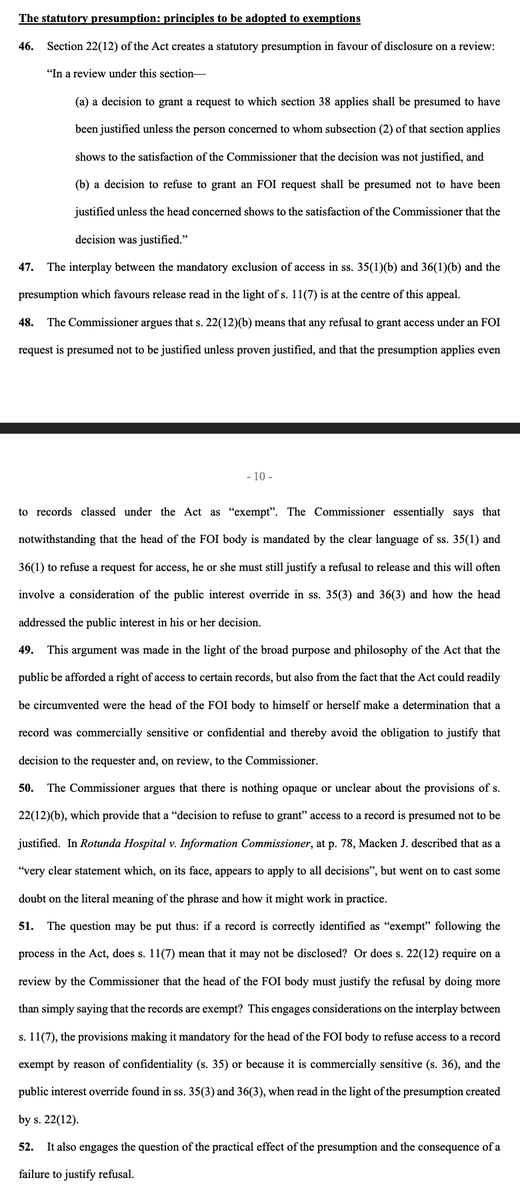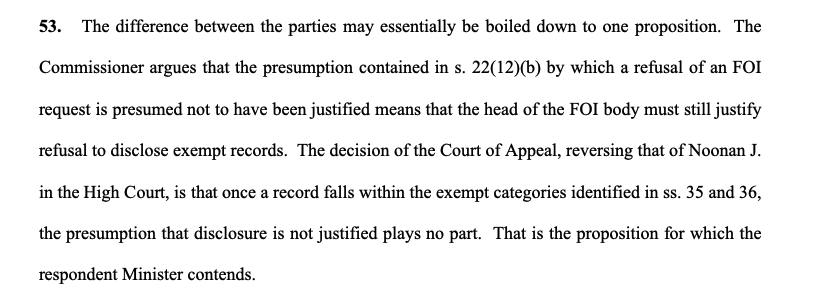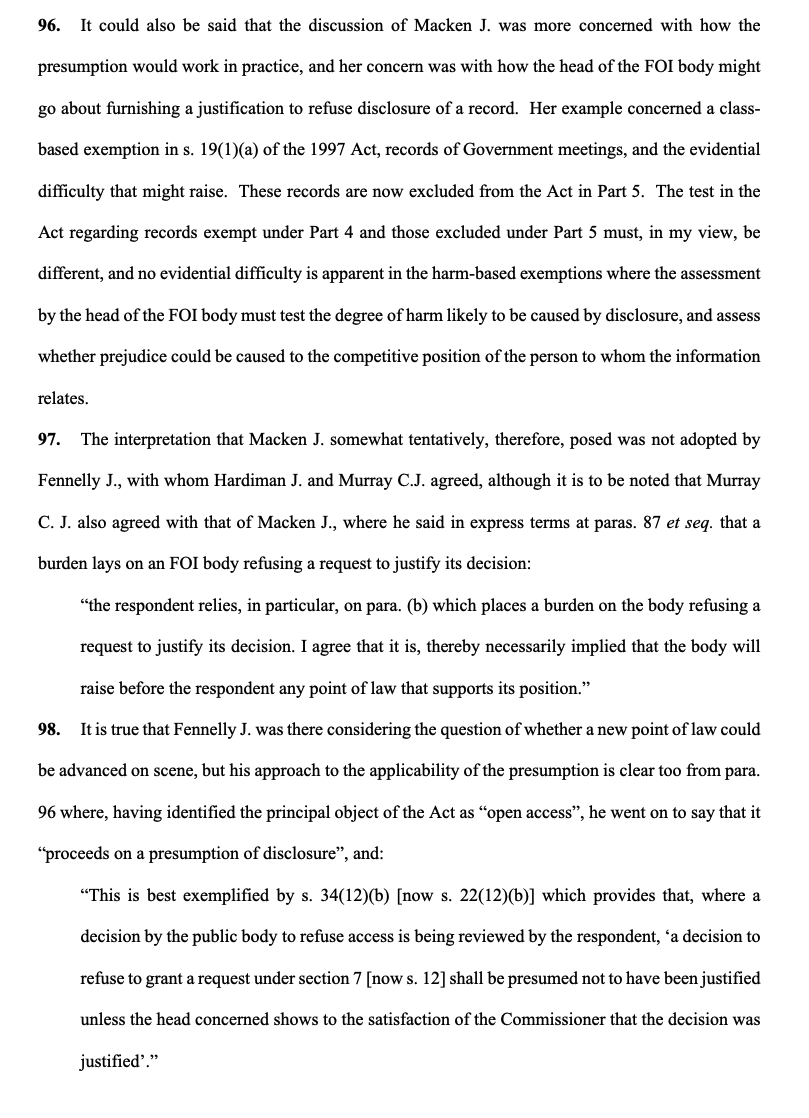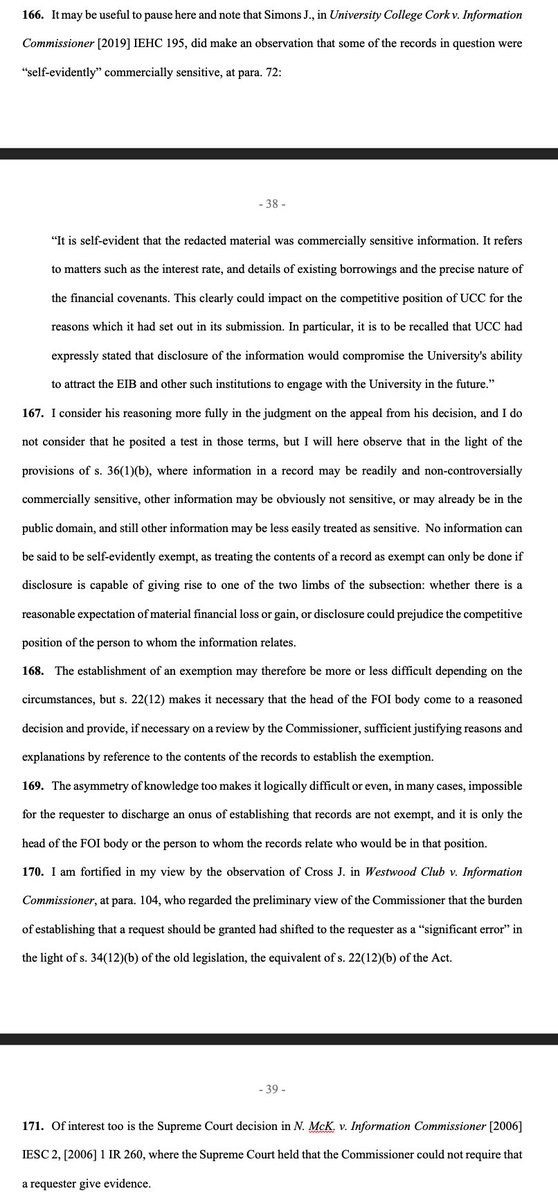Some background on the impending Supreme Court judgment. Here& #39;s a brief history of the MANs project: https://twitter.com/gavinsblog/status/1024320964027449345">https://twitter.com/gavinsblo...
Here& #39;s a thread from the Court of Appeal phase https://twitter.com/gavinsblog/status/1092703027578978305">https://twitter.com/gavinsblo...
Here& #39;s all the submissions from the Supreme Court appeal: https://www.thestory.ie/2020/02/03/supreme-court-legal-submissions-in-minister-for-communications-enet-and-the-information-commissioner/">https://www.thestory.ie/2020/02/0...
The High Court judgment from 2017 presents a good summary of the issues at hand (we won that one)
https://www.courts.ie/view/judgments/ec0f9166-60ea-4cc3-99af-be7a42ca27cf/298429c7-99ba-4fc2-b150-5826bfaac067/2017_IEHC_222_1.pdf/pdf">https://www.courts.ie/view/judg...
https://www.courts.ie/view/judgments/ec0f9166-60ea-4cc3-99af-be7a42ca27cf/298429c7-99ba-4fc2-b150-5826bfaac067/2017_IEHC_222_1.pdf/pdf">https://www.courts.ie/view/judg...
I sent my FOI request on January 2, 2015. Lol.
Other parties besides myself involved:
The Minister for Communications
The Information Commissioner
University College Cork
RTÉ
eNet
The Minister for Communications
The Information Commissioner
University College Cork
RTÉ
eNet
Update: it& #39;s a long judgment.
*sips tea* Ok.
Judgment is by Justice Marie Baker btw
The above bit is one of the core features of the Act and of this case.
Fascinating part re how Birmingham in the Court of Appeal interpreted Rotunda. This relates to obiter comments made by Macken.
"a court should not lightly depart from the literal words in a statute"
"I must conclude that the comments of Macken J. are obiter and that they do not provide a useful basis on which to resolve the role of the presumption in a review..The approach of the Court of Appeal which took her obiter comments as a starting point must, therefore, be incorrect
We argued that Macken& #39;s comments were clearly obiter. The Supreme Court has agreed.
Now we are into the meat of the judgment. An issue raised by Conor Power SC for the Minister was that a record could be exempt (notwithstanding Part 5 of the Act where certain records are *explicitly* excluded), in and of itself. Baker says no - and we agree with her.
"the Commissioner, in reviewing the result of the conclusion of the evaluative process, is entitled to, and indeed must, approach the review on the basis that he must be satisfied that the conclusion reached by the head of the FOI body is properly reasoned and justifies.. refusal
The Minister has comprehensively lost the argument here. "A decision to refuse access must be made for justifying reasons." "The Oireachtas chose to place an onus to justify a decision to refuse."
"...FOI body.. must be conscious at all stages of the process that the overriding presumption is one of disclosure, with the result that any refusal to disclose must be fully reasoned and sufficiently coherent, fact specific, and logically connected to the document or record..."
"the structure of the Act tends towards disclosure, such that a decision to refuse is prima facie not justified, and the decision to grant it in the public interest is prima facie justified." We strongly argued this was the case. Baker agrees.
Baker then deals with the odd situation we might find ourselves in if the requester had to justify the release of a record they had never had sight of. We argued this would make the Act unworkable.
Baker on the Simons judgment in UCC, who (in passing it seems) observed some records could be "self-evidently commercially sensitive".
Nope.
"No information can be said to be self-evidently exempt"
Nope.
"No information can be said to be self-evidently exempt"
"The asymmetry of knowledge too makes it logically difficult or even, in many cases, impossible for the requester to discharge an onus of establishing that records are not exempt, and it is only the head of the FOI body ..[..].. would be in that position."
On the issue of how the Commissioner applied a sort of standard in his decision of "totally undermine" the business. Critical but not outright.
Baker is setting something of a new bar here for public interest release of commercially sensitive records, such as the contract at issue in this case.
"... the right [of access] exists but is one tempered by the existence of exemptions." This is true.
On the above point - much of Birmingham& #39;s reasoning in the Court of Appeal has been deemed incorrect.
Now turning the section 35. Key sentence from Baker:
"A contract between an FOI body and a service provider can protect the confidentiality of third parties but an FOI body cannot, as part of an agreement with the service provider, contract out of the Act."
"A contract between an FOI body and a service provider can protect the confidentiality of third parties but an FOI body cannot, as part of an agreement with the service provider, contract out of the Act."
"The plain words of the sub-section do not limit its application to the records prepared by a public body qua FOI body, and therefore, the narrow construction is not afforded support by a literal reading."
Overall, basically all of our core (and the OICs) arguments were accepted by the Supreme Court.
The OIC will have to change how it approaches review. Baker has set some new guidelines about what the "public interest" is and she was critical of how the OIC made its decision.
The OIC will have to change how it approaches review. Baker has set some new guidelines about what the "public interest" is and she was critical of how the OIC made its decision.
The Court of Appeal judgment has been largely overturned.
Rotunda has been largely put back in its box (thankfully)
Rotunda has been largely put back in its box (thankfully)
Baker has re-asserted some core tenets of the FOI Act, which were thrown into doubt by the Court of Appeal.
It& #39;s a good decision overall.
I& #39;ll tweet the UCC decision in a bit.
It& #39;s a good decision overall.
I& #39;ll tweet the UCC decision in a bit.
I& #39;m grateful to @FPLogueLaw and John Kenny BL for excellent representation throughout the last five years, at all stages of appeal. They have been exceptional throughout.

 Read on Twitter
Read on Twitter


























!["... the right [of access] exists but is one tempered by the existence of exemptions." This is true. "... the right [of access] exists but is one tempered by the existence of exemptions." This is true.](https://pbs.twimg.com/media/EiwoflXXkAAM9xK.png)




